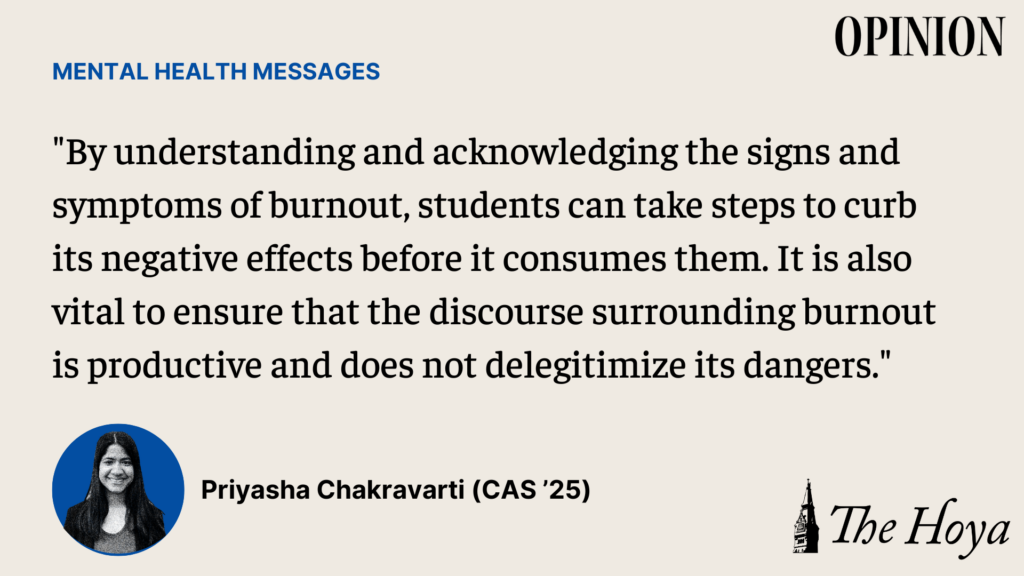The Jan. 19 resignation of Jacinda Ardern, the former prime minister of New Zealand, sparked a global discourse about the notion of burnout. News outlets such as The New York Times, The Washington Post and the BBC highlighted this idea of ‘burning out’ as the primary reason behind her decision.
“I know what this job takes, and I know that I no longer have enough in the tank to do it justice,” Ardern said in her resignation speech. “It is that simple.”
According to Psychology Today, “burnout is a state of emotional, mental, and often physical exhaustion brought on by prolonged or repeated stress.” Burnout usually occurs alongside emotional exhaustion, depersonalization and a diminished sense of personal accomplishment, according to the Maslach Burnout Inventory.
It can impact anyone — from key world leaders to college students.
By understanding and acknowledging the signs and symptoms of burnout, students can take steps to curb its negative effects before it consumes them. It is also vital to ensure that the discourse surrounding burnout is productive and does not delegitimize its dangers.
This is especially important at an elite university like Georgetown, where hustle culture is ever-present for academics, internships and other professional endeavors.
Burnout emerges without us even realizing it, especially during midterms, internship application cycles and recruiting periods. Students in higher education institutions are particularly vulnerable to burnout, given the high stress and competitive conditions of university environments. The American Psychological Association’s Stress in America study found that among Gen Z adults in college, 87% said their education was a significant source of stress.
When I think of burnout, I typically think of stress-induced burnout as a byproduct of spreading myself too thin and taking on too many responsibilities. But burnout is more long-term than stress — and it has greater impacts on our physical and mental health. When I am burned out, I tend to become more careless with the structure of my daily routine, call my family less often and feel tired more often.
Another sign of burnout is the struggle to complete tasks that would normally come easy to someone. One may find little interest in engaging in activities that normally excite them, which might lead to more irritability, anger and a sense of worthlessness.
While some believe that burnout only occurs when one takes on too many responsibilities, it also comes from doing too little of what someone loves and enjoys. Working toward a goal that does not resonate with someone can result in more feelings of disinterest and discouragement. At Georgetown, if a student is participating in a club or pursuing a major that does not resonate with them, they could find themselves losing motivation and interest, eventually leading to burnout.
Ardern provides a powerful reminder of this: it is okay to take a break or quit when burnout becomes too extreme. She legitimizes the concept of burnout, demonstrating that it can be a valid reason to step away from a long-term commitment. Mental health issues impact individual performance just as much (if not more) than physical health issues.
Mental health is very personal and subjective, and it is only up to the individual, their family and mental health experts to determine the scope of the issue. Use Georgetown’s mental health resources (such as Counseling and Psychiatric Service or HoyaWell) and take a break if you feel burnt out, stressed or unable to keep going — in the academic, extracurricular, professional and personal sense. It is important to understand how much you have in your “brain tank” to do a task properly. While time management and hard work are key to success, remember that it is always acceptable to take a break and ask for help.
When I notice that I may be feeling overwhelmed, stressed or on the verge of burnout, I like to reflect and change up my strategies. I try to prioritize my sleep, plan out my commitments on Google Calendar and focus on the activities that bring me joy. If you feel a continued sense of dread or exhaustion when thinking about certain activities, you might need to reevaluate your involvement in them.
Getting off of Georgetown’s campus also helps overcome periods of stress and burnout. With breaks like spring break, think about how going home or going to a new place can help heal any recent stressful episodes. Take time to evaluate your relationship with your responsibilities to ensure a sustainable and balanced lifestyle.
Priyasha Chakravarti is a sophomore in the College of Arts & Sciences. Mental Health Messages is published every third Friday.














